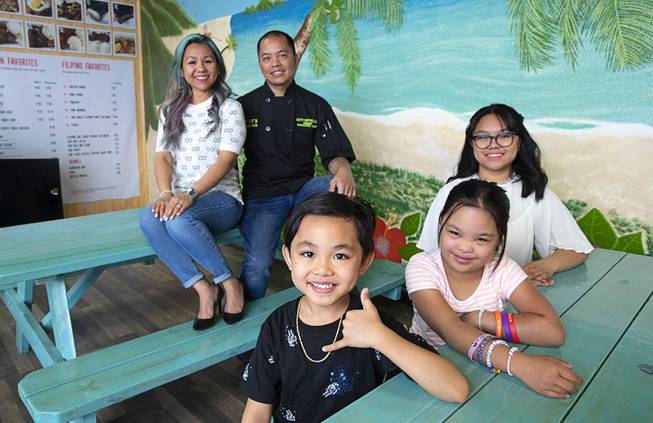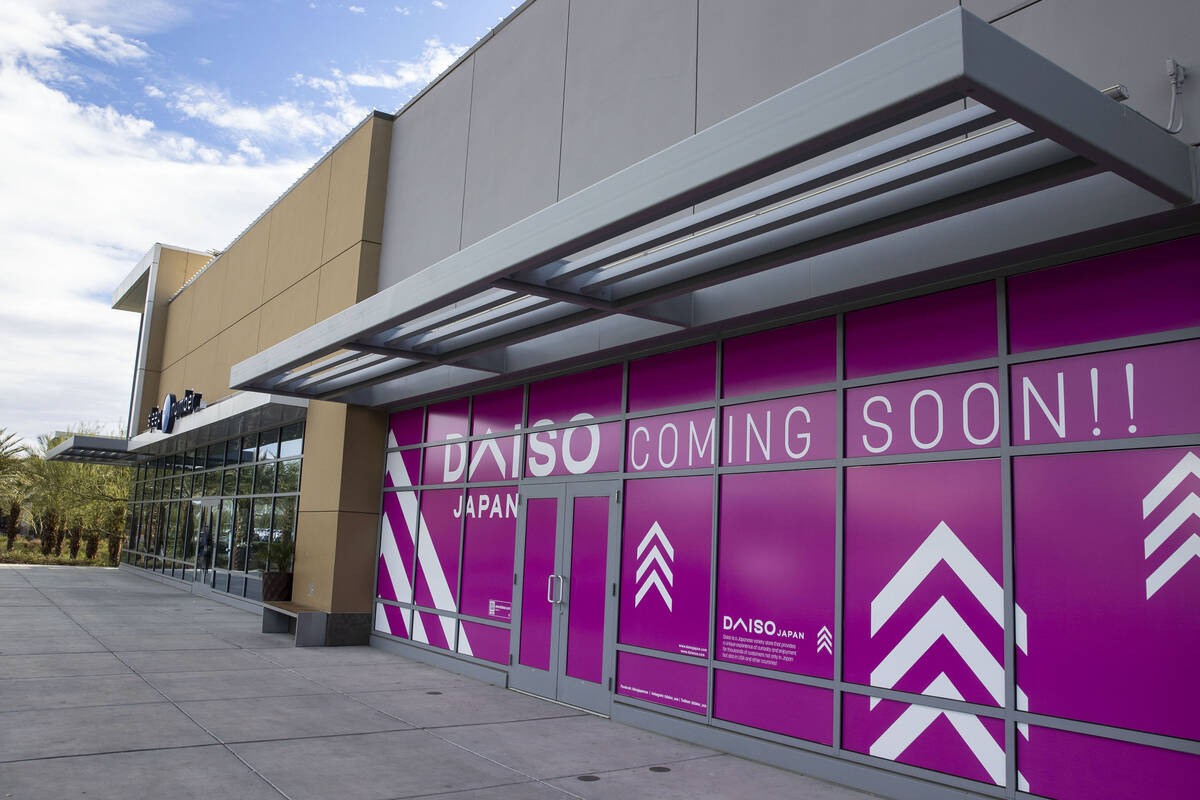Steve Marcus
Jeanette and Lefty Battulayan, owners of Lefty-J’s Restaurant, will be sitting with their children Jacob (6), Jade (11) and Juhl (14) on Friday, July 30, 2021 at 860 E. Twain Ave. Lefty-J’s is just a Hawaiian hangout in the Las Vegas Valley. Approximately 50,000 Hawaiians call Las Vegas their home, and community members say they grew even closer during the pandemic by taking care of each other.
Thursday, August 5, 2021 | 2 a.m
A hand-painted, bright orange sun hangs on the walls of Lefty-J’s, a Hawaiian-Filipino restaurant in Las Vegas, its blue water absorbing a textured, colorful sunset.
Two crooked palm trees form the center of the restaurant’s striking mural, which depicts an expansive, yellow-brown beach and a towering blue ocean.
Co-owner Jeanette Battulayan said the painting pays homage to her home island of O’ahu, Hawaii and the “aloha spirit” of bringing good feelings to others. Her memories swirl around the time her family visited China Man’s Hat, a beach in O’ahu, and the waterfront hamburger steak dinners and barbecue combos – meals she and her husband, Lothguard “Lefty” Battulayan, at Lefty served. J’s on East Twain Avenue since it opened in 2018.
“It’s one of the greatest memories of all time,” said Jeanette Battulayan. “We would always grill at home, just like we would grill here. It’s old school style. I mean the taste, the burst and the great memories … the real flavors of home. “
Those flavors and the spirit of home took on a different meaning during the pandemic as Lefty-J’s was on the front line helping the valley’s many Hawaiian families during the economic downturn. They used their social media pages to promote free meals like chili rice and chicken plates, and also gave away five gallons of rice per customer.
They have tailored their menu to suit families. The restaurant’s Famous 5 Star offering, a hearty meal of teriyaki beef, barbecue chicken, katsu chicken, roast chicken, and veal short ribs, was created to be shared among family members.
“It was a great way to showcase ourselves because when customers or locals were looking for restaurants they couldn’t go in and dine in, we were here to pretty much serve them,” he said. “That’s why we started to found our ‘Famous 5 Star’, where it was more of a food offer so that families could actually eat together at these times.”
Las Vegas is so popular and populated by Hawaiians that it is affectionately known as the “ninth island” of Hawaii. Crowds of Hawaiian tourists also travel to Las Vegas and populate places like the downtown California Hotel, which serves classic Hawaiian dishes like oxtail soup, said David Strow, vice president of corporate communications at Boyd Gaming. In 2019, Strow said 67% of California hotel rooms were occupied by Hawaiian tourists.
Other locals like the Battulayans are rooted in the city as a cheaper alternative to island living. As of 2018, approximately 50,000 Las Vegas residents are Hawaiian, and over 300,000 Hawaiian tourists visit Las Vegas each year.
They weren’t the only group to lend a hand.
Local organizations such as the Ninth Island Aunties, founded in 2004, also supported the Las Vegas community, particularly families who had contracted COVID-19 or whose family members had died from the virus. Founder Cathi Minami said that while Ninth Island Aunties is a Designated Organization for Asia-American and Pacific Islanders (AAPI) – one aspect they can use to qualify for certain fundraising campaigns like Give In May – they and their volunteers Families do not depend on their races.
Ninth Island aunts find families in need through word of mouth. Volunteers assisted about 70 families during the pandemic, Minami said by conducting grocery stores and deliveries for people in quarantine and by continuing their usual service of curating and serving holiday meals.
Give In May, held during Asian Pacific American Heritage Month, is a digital fundraiser for local organizations that support the AAPI community. The pandemic not only resulted in an increased need for fighting families, but also an increase in hate crimes against Asian Americans.
Through Give in May, the Ninth Island Aunts won the victory with a sum of $ 17,000, a number that would normally take two and a half years, Minami said. She said the organization will use the money to help about 100 families during Thanksgiving and Christmas.
“You can party like everyone else in America,” she said.
Celebrations of Hawaiian culture were also the order of the day before the pandemic. Little Grass Shack is a Hawaiian radio broadcast founded in 1999 by KUNV 91.5-FM. Every Sunday from noon to 4 p.m., Emory Nihipali, a host on Little Grass Shack, said the show features tunes from classic Hawaiian musicians such as Israel Kamakawiwo’ole and Linda De La Cruz. The broadcaster also brings in guests such as recruiters to inform listeners of job vacancies or doctors to disseminate information about public health.
Doreen Hall, president of the Las Vegas Hawaiian Civic Club and a celebrity on the radio show, said music is essential to the Las Vegas Hawaiian community as it can provide insight into the island’s history. The radio show was also an important platform to discuss pre-travel tips and COVID-19 and flu vaccines during the pandemic, Hall said.
“We play our island music, but you see how different platforms can be positive for our community,” she said. “Little Grass Shack has been instrumental in raising awareness of education on our platform during this pandemic as we play music every Sunday.”
Nihipali used the radio’s platform to share his experience with COVID-19. In April, Nihipali was hospitalized for about a week for the virus, and months later he still needs an oxygen cylinder to breathe normally, he said.
“When I went back to the radio, I was trying to let people know, ‘COVID is real people. It is real. I’m talking to you, ‘”he said. “The person I got it from, that guy died. … I’m kind of happy to be alive. “
The Las Vegas Hawaiian Civic Club has spread Hawaiian culture through language, dance, music, arts and crafts, traditions and values since 1989, Hall said. The civic club also funds several scholarships for young Hawaiians who are high school or freshmen in college.
During the pandemic, the club held pop-up make-up or craft fairs and organized the Pacific Islander Festival in early September. Hall, who was born and raised in Hawaii, said the Hawaiian community has flourished before her in the two years since she moved to Las Vegas.
“It is a challenge for us to be in other states,” she said. “During this pandemic we got really close because if we can’t take care of each other, we can’t support each other, what will happen then?”












